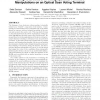Free Online Productivity Tools
i2Speak
i2Symbol
i2OCR
iTex2Img
iWeb2Print
iWeb2Shot
i2Type
iPdf2Split
iPdf2Merge
i2Bopomofo
i2Arabic
i2Style
i2Image
i2PDF
iLatex2Rtf
Sci2ools
123
click to vote
SAC
2009
ACM
2009
ACM
Taking total control of voting systems: firmware manipulations on an optical scan voting terminal
The firmware of an electronic voting machine is typically treated as a “trusted” component of the system. Consequently, it is misconstrued to be vulnerable only to an insider attack by someone with an in-depth knowledge of the system and access to the source code. This case study focuses on the Diebold/Premier AccuVote Optical Scan voting terminal (AV-OS) that is widely used in the USA elections. We present three low level manipulations of the above voting terminal’s firmware resulting in divergence from its prescribed operation: (i) the first bestows the terminal with a powerful memory card dumping functionality, (ii) the second enables the terminal to leak the ballot details through its serial port thus violating voter privacy during the election, (iii) the final third firmware manipulation is a proof of concept attack that swaps the votes of two candidates thus permanently destroying the election outcome in an undetectable fashion. This demonstrates the extent to which t...
| Added | 23 Jul 2010 |
| Updated | 23 Jul 2010 |
| Type | Conference |
| Year | 2009 |
| Where | SAC |
| Authors | Seda Davtyan, Sotiris Kentros, Aggelos Kiayias, Laurent D. Michel, Nicolas C. Nicolaou, Alexander Russell, Andrew See, Narasimha Shashidhar, Alexander A. Shvartsman |
Comments (0)

